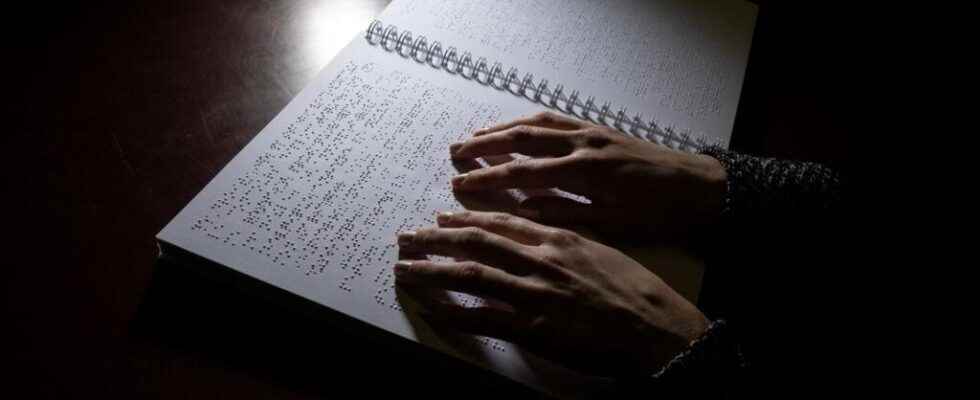This Wednesday, January 4, World Braille Day, more than 2,000 books in Braille were made available at the single book price, which until then had only been applied to so-called classic books, which can be found in bookstores. An initiative that allows books to be less expensive and therefore more accessible to people with visual impairments.
According to the estimates of theWorld Health Organization, at least 2.2 billion people have visual impairment affecting near or far vision worldwide. In France, the French Federation of the Blind estimates that 1.7 million people have a visual impairment (207,000 blind and 932,000 moderately visually impaired). So this announcement made by the Braille Transcription and Editing Center (CTEB) on reducing the price of books on World Braille Day already sounds like a victory.
The law on the single price of the book of August 10, 1981 – the Lang law – provides that the same book is sold at the same price to the end customer, up to a discount of 5% that each retailer can practice. But this single price, also called the bookseller’s price, did not apply to books in Braille. ” For nearly forty years this was not possible due to the cost of producing Braille books. “, explains Adeline Coursant, director of the CTEB.
The CTEB has the largest production capacity for Braille books in France and also supplies certain media libraries abroad – in Canada, Belgium, Switzerland, and in certain African countries in French-speaking Africa -. But the cost of producing a single book is 700 euros and it takes three weeks in total between the time of transcription, proofreading and printing of the book. ” This therefore requires more time and more resources. And this necessarily affects the cost of the book to purchase, which is three to five times more expensive than a classic book sold in bookstores. “recalls Adeline Coursant.
►Also to be heard: The invention of braille
The financial means necessary to sustain this unique price
If the announcement of better access to braille books sounds like a victory, it is a short-term victory. Since its creation in 1989, the CTEB has always fought to find funding in order to produce more books in Braille, ” to restore this social inequality in access to culture and access to books “. But it is only thanks to an associative fund within the CTEB that the accessibility of books in Braille at a bookseller’s price has been made possible. A risky bet for the association since it considers that it only has the means to publish the books with their own funds for two years. After which, she hopes to be able to continue thanks to multiple aids: “ Donations, aid from public authorities or patrons “, specifies the director of the CTEB.
Vincent Michel, honorary president of the Federation of the Blind of France, insists on the exorbitant sale price of books in Braille before the establishment of this single price: ” For a book that cost 20 euros in bookstores, it cost 80 euros in the catalog of braille books offered by the CTEB. This means that a visually impaired reader would pay the 80 euros out of pocket, since no shopping aid exists for blind readers.
At such a price, these readers could not therefore afford to buy many books a year, where they will be able to obtain more thanks to the bookseller price now applied to books in Braille. The CTEB catalog has until now offered its books for sale between 60 and 122 euros, they will now be sold at prices between 11 and 30 euros. So it’s a ” explosion of joy for everyone “, believes Adeline Coursant. But better access to culture through books depends not only on their selling price, but also on the diversity of the books on offer.
Enable better access to knowledge
More than 100,000 books are produced and printed in France, but only 3% are transcribed into Braille, a very limited choice for readers with visual impairments. A lack of diversity of books that the CTEB and the French Federation of the Blind deplore with one voice. The CTEB has a catalog of 2,000 books in Braille, but this presupposes a difficult choice for the selection of books. Obviously, the books which receive prizes and which are part of the literary returns are published by the CTEB, but each book sold in ten or twenty copies on average, because of the price. A figure far from that of sales of classic books, estimated at 422 million copies in 2020 by the national publishing union.
Access for all to books is essential, since this allows access to knowledge: ” We cannot speak of social inclusion if there is not total access to books, and it is through books that knowledge passes “recalls Vincent Michel. For the honorary president of the Federation of the Blind of France, reading remains one of the keys to success at school and university, yet many books and specialized works are not transcribed into Braille. ” So today we broke through, but we didn’t win it all. »
A further step towards access to culture has therefore been taken for visually impaired readers, but the CTEB, like the Federation of the Blind in France, hope in the future to be able to produce more and more books. And in the long term, that almost all the books published in bookstores be accessible in Braille – in paper or digital version -, in large print or in audio recordings.
Selling books at market price, “this eliminates the discriminatory phenomenon vis-à-vis blind and partially sighted people who had to pay more” for the same precise book @gendron_bruno Chairman of @Blind_France
— BLIND FROM FRANCE (@Blind_France) January 4, 2023
►Read also: Sound libraries: a concept that listens to the blind and visually impaired
